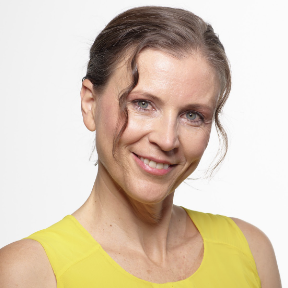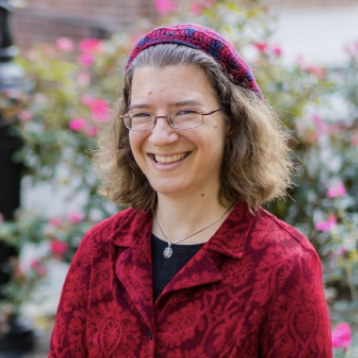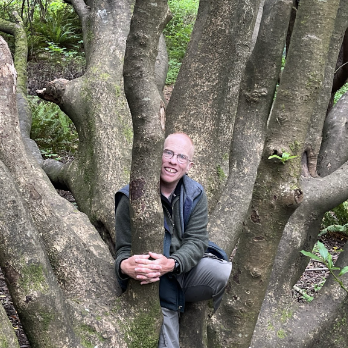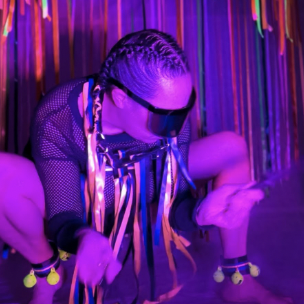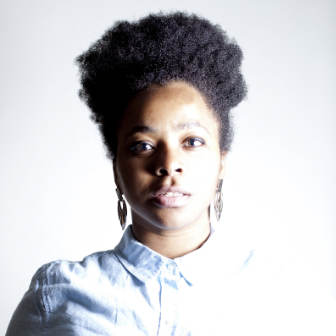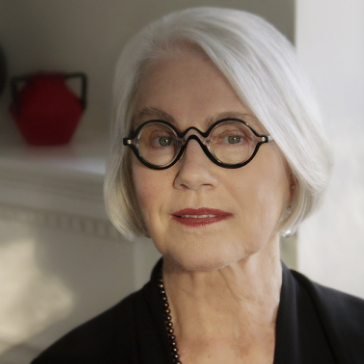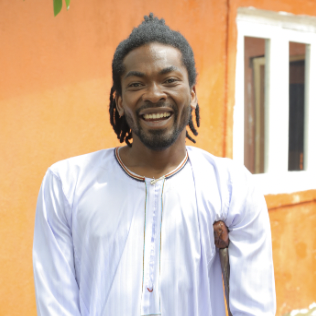2024 Artists/Scholars
Nadia Adame
Nadia Adame is a Spanish multidisciplinary award-winning artist with a spinal cord injury. She studied Ballet & Flamenco at the Royal Dance Conservatory of Madrid and has a BA in Theatre from the University of Colorado. She was a company member with AXIS (2000-2003) and Candoco Dance Company (2007-2008). In 2004, she co-founded and was the Co-Artistic Director of Compañía Y in Spain with Mark Swetz, a multimedia and performance collective. Nadia’s credits include dance, theatre, commercial, and independent film projects in the UK, Spain, US, and Canada. Nadia became the Artistic Director at AXIS Dance Company in January 2022.
Photo Description: Nadia’s mid headshot image is set on a white background. She is a light skin woman with brown hair pulled back and a couple of pieces of wavy hair over her face. She has light green eyes and is smiling and tilting her head a little bit. Nadia is wearing a sleeveless yellow top.
Julia Watts Belser
Eli Clare
White, disabled, and genderqueer, Eli Clare lives near Lake Champlain in unceded Abenaki territory (also known as Vermont) where he writes and proudly claims a penchant for rabble-rousing. He has written two books of essays, the award-winning Brilliant Imperfection: Grappling with Cure and Exile and Pride: Disability, Queerness, and Liberation, and a collection of poetry, The Marrow’s Telling: Words in Motion. Additionally he has been published in dozens of journals and anthologies. Eli works as a traveling poet, storyteller, and social justice educator. He currently serves on the Community Advisory Board for the Disability Project at the Transgender Law Center and was a Disability Futures Fellow in 2020. Among other pursuits, he has walked across the United States for peace, coordinated a rape prevention program, and helped organize the first ever Queer Disability Conference.
Photo Description: A white transmasculine person with buzzed red hair wearing glasses and a green vest smiles while standing in a myrtlewood tree. His hands clasp the branch he is leaning against.
Raven Davis
Raven Davis is an Anishinaabe, 2-Spirit, multidisciplinary artist, educator, and mediator whose mother is from Treaty Four, Manitoba. Davis was born and raised in Michi Saagig Territory, Toronto, Ontario. Davis weaves their passions for land-based and archival research, with calls to action, movement, sound, and works embodied by lived and intergenerational experience. A parent of three sons, Davis works within the mediums of performance, movement, visual arts, and sound/media, and engages with topics such as, colonization, race, gender, disability, abolition, pleasure, and 2-Spirit/Indigiqueer identity. As an extension of their responsibilities as a Land and spiritual practitioner, and as a way to reconcile the aforementioned, they create spaces using installation, relational aesthetics, ritual, and movement that support individuals in self-actualization and restorative journeys. For over 30 years, Davis has advocated for equitable and community-centered art and 2 Spirit, trans, and disabled BIPOGM futures.
Adjua Gargi Nzinga Greaves
Rosemarie Garland-Thomson (RGT)
Rosemarie Garland-Thomson is a disability justice and culture thought leader, bioethicist, educator, and humanities scholar. Her 2016 op-ed, “Becoming Disabled,” was the inaugural article in the ongoing weekly series in the New York Times about disability by people living with disabilities. As a bioethicist, she is a Hastings Center Fellow and Senior Advisor and a Center for Genetics and Society Fellow who publishes frequently in academic journals and an expert consultant in bioethics and disability. She is currently chief project advisor to The Art of Flourishing: Conversations on Disability and Technology, a Hastings Center project supported by the National Endowment for the Humanities. As a humanist, she is currently a National Endowment for the Humanities Public Scholar.
She is co-editor of About Us: Essays from the New York Times about Disability by People with Disabilities (2019) and the author of Staring: How We Look and several other books. She is professor emerita of English at Emory University, where taught disability studies, bioethics, American literature and culture, and feminist theory. Her academic and scholarly work develops the field of critical disability studies and the health humanities to bring forward disability culture, access, and justice to a broad range of institutions and communities.
Photo Description: this professional headshot shows RGT as a mature, average-sized white woman with pale skin, silver hair, black and white glasses, in a black jacket and dark pearls, posed before a white fireplace mantle decked with a black and a red vase.
Tebandeke Joseph
I am a dancer and choreographer from Uganda. My work stretches the idea of dance, going into contemporary art with a.o. drawings and sculptures. My work involves other arts practices but also communities in addressing urgent social challenges, mainly dominant ideas around ability. I use my body to create my own dictionary of ability. I have been developing a physical practice that encompasses different local and global dance traditions and movement practices. I am a dancer in sector and a society that systematically marginalizes “disabled” people. I am a choreographer as I mobilize local communities to create a movement that will re-label “disability”. I am committed to decolonizing dance as a language that all can access and that benefits from diversity and the different notions of ability, through owning the aesthetic expression and developing self-esteem for persons with disabilities. And questioning the intersection of the world where the concept of being able or disable meet.I have worked in different location such as; Kampnagal_Hamburg, (Mental workout 2023), Berlin (moving Margin Research 2022), South Africa (Sibikwa Arts fest 2022), Vienna (ImPulsTanz 2022), Sweden (Assitej children’s fest) Mali (Eco fest 2020), Freiburg contact impro Festival (Germany in 2019), East Africa Nights of Tolerance Festival (Rwanda 2017), Tuzinne Festival (Uganda 2017- 2018) Ubumuntu (Rwanda 2018)
